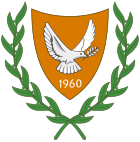2011 Cypriot legislative election: Difference between revisions
No edit summary |
Magioladitis (talk | contribs) image doesn't show |
||
| Line 13: | Line 13: | ||
<!-- Democratic Rally --> |
<!-- Democratic Rally --> |
||
| image1 = |
|||
| image1 = [[File:Flickr - europeanpeoplesparty - EPP Congress Bonn (687).jpg|150x150px]] |
|||
| leader1 = [[Nicos Anastasiades]] |
| leader1 = [[Nicos Anastasiades]] |
||
| leader_since1 = |
| leader_since1 = |
||
Revision as of 23:22, 24 May 2011
| |||||||||||||||||||||||||||||||||||||||||
All 56 seats to the Vouli ton Antiprosópon | |||||||||||||||||||||||||||||||||||||||||
|---|---|---|---|---|---|---|---|---|---|---|---|---|---|---|---|---|---|---|---|---|---|---|---|---|---|---|---|---|---|---|---|---|---|---|---|---|---|---|---|---|---|
| |||||||||||||||||||||||||||||||||||||||||
A legislative election to the 56-member Vouli ton Antiprosópon was held in Cyprus on 22 May 2011.
Background
The election follows a presidential election in Northern Cyprus which was won by the candidate of the right Dervis Eroglu who beat leftist incumbent Mehmet Ali Talat amid fears of a halt in peace talks for a unified Cyprus; it also follows a similar legislative election.[1] Similarly, a right-wing party won the last election.
Conversely, in Greece the previous election was won by the Panhellenic Socialist Movement defeating the conservative New Democracy. Roughly a month after this poll, Turkey would hold its election.
Political system
Cyprus has a presidential system of government in which the parliament elects the all-important president.[2]
Cypriot conflict
The election was important as an adverse result against conflict resolution talks could also affect Turkey's accession to the European Union. Though this election would not directly affect the Cypriot presidential election, 2013, it could set a precedence for coalition alliances.[2]
Current negotiations between the two parties concern the establishment of a federation of two states with a loose central government, though implementing the proposal has run into obstacles and Northern Cyprus have not abandoned a wish for independence. Such hindrances include territorial swaps and property rights of thousands of internally displaced persons.[3]
Parties
 |
|---|
Incumbent President Demetris Christofias governs with a coalition of his Progressive Party of Working People (AKEL) and the Democratic Party (DIKO) which has 11 seats.[2] Both AKEL and the centre-right Democratic Rally (DISY) have 18 seats.[3]
Other parties include: the Movement for Social Democracy (EDEK) (currently 5 seats), the European Party (currently 3 seats) and the Ecological and Environmental Movement (currently with 1 seat).[3]
Issues
DIKO has criticised Christofias' offer for a rotating presidency with Northern Cyprus as part of deal to settle the Cypriot conflict.
The incumbent government was also criticised for its "slow response" to the financial crisis, in which Cyprus experienced its first recession in more than three decades.[2]
Opinion polls
The opposition centre-right Democratic Rally showed a slight lead of the AKEL Party.[2] Though it was still forecast to fall short of a majority in the 56-seat parliament.[3]
Election
The Interior Ministry estimated a total Greek Cypriot eligible voting population of 530,000. Additionally, about 544 Turkish Cypriots residing in the Republic's government controlled areas are eligible to vote.[3]
Democratic Rally finished with 34.27 percent and AKEL followed with 32.67 percent.[4]
It was noted that the abstention rate was very high at 21%, considering that voting is compulsory.[5]
Template:Cyprus legislative election, 2011
Analysis
An op-ed in the Turkish Hurriyet suggested two repercussions: an impact on the presidential election; and an effect to the United Nations-led direct reunification talks. This could be further hurt as the junior members of the governing coalition had shown sings of a rift with AKEL and Christofias over the reunification talks, as well as social and economic policies. It suggested a "grand coalition," though acknowledging it was a massive ask due to the burgeoning ambitions of both the two biggest parties for the presidency between incumbent Christofias and the DISY's Nicos Anastasiades. It pointed out that though AKEL still had wide-backing there were overall performance of the government had lost some support. Additionally, it suggested peace talks would add pressure to Northern Cyprus should a grand coalition come to fruition and allow bring in a "strong leadership...to engage in a give-and-take." The first test of a such a possibility would be the election of the parliamentary speaker.[2]
[A grand coalition] would produce the best chance ever for a Cyprus settlement. - Hurriyet
Footnotes
- ^ "Hardliner wins Turkish Cypriot leadership election". Associated Press. Guardian. 18 April 2010. Retrieved 24 May 2011.
- ^ a b c d e f "Greek Cypriots to vote in general elections". Hurriyet. 20 May 2011. Retrieved 24 May 2011. Cite error: The named reference "hurriyet" was defined multiple times with different content (see the help page).
- ^ a b c d e Christine Pirovolakis (19 May 2011). "Cyprus to elect new parliament on Sunday". Retrieved 24 May 2001.
- ^ "Right-wing opposition wins Cyprus election". Aljazeera. 2011-5-22. Retrieved 2001-05-24.
{{cite news}}: Check date values in:|date=(help) - ^ "Opposition DISY wins parliamentary elections in Cyprus". Famagusta Gazette, CNA, Xinhua. SETimes.com. 23 May 2001. Retrieved 24 May 2011.
External links
- Election results
- Election triumph for opposition DISY
- NSD: European Election Database - Cyprus publishes regional level election data; allows for comparisons of election results, 1990-2011
